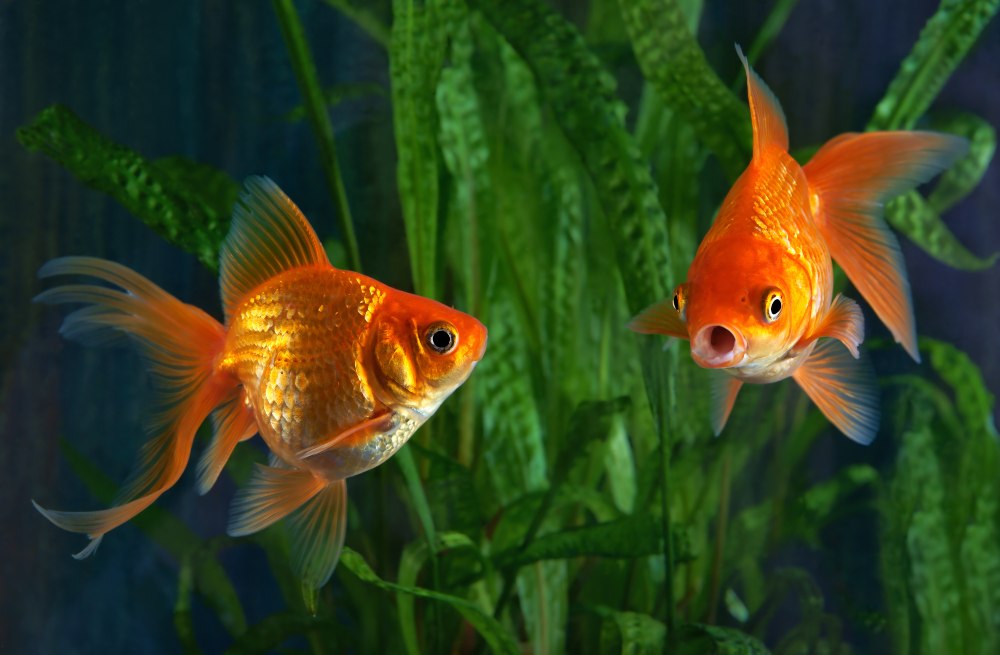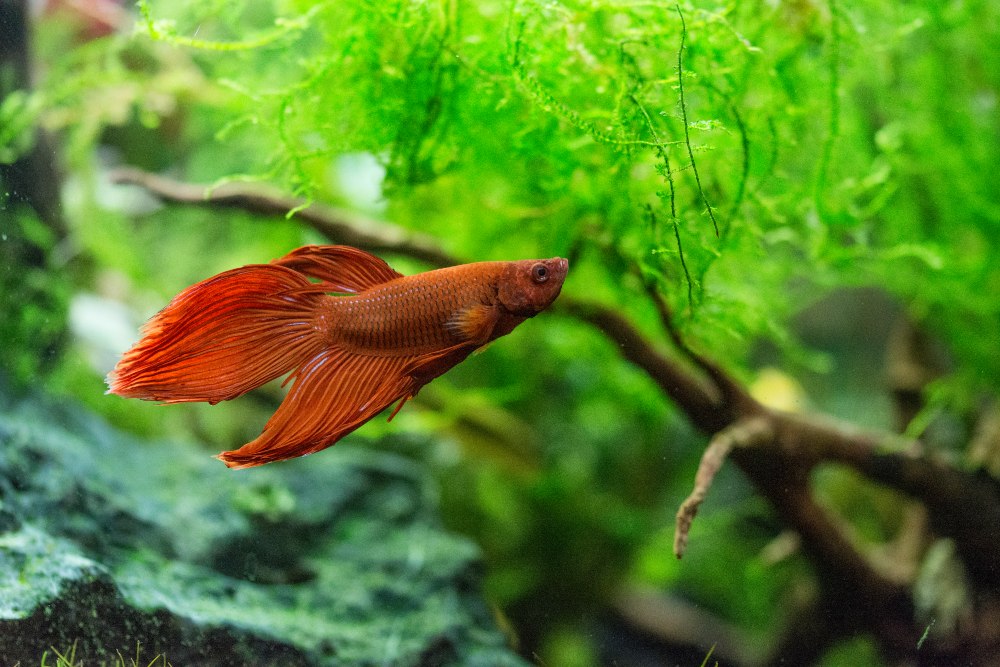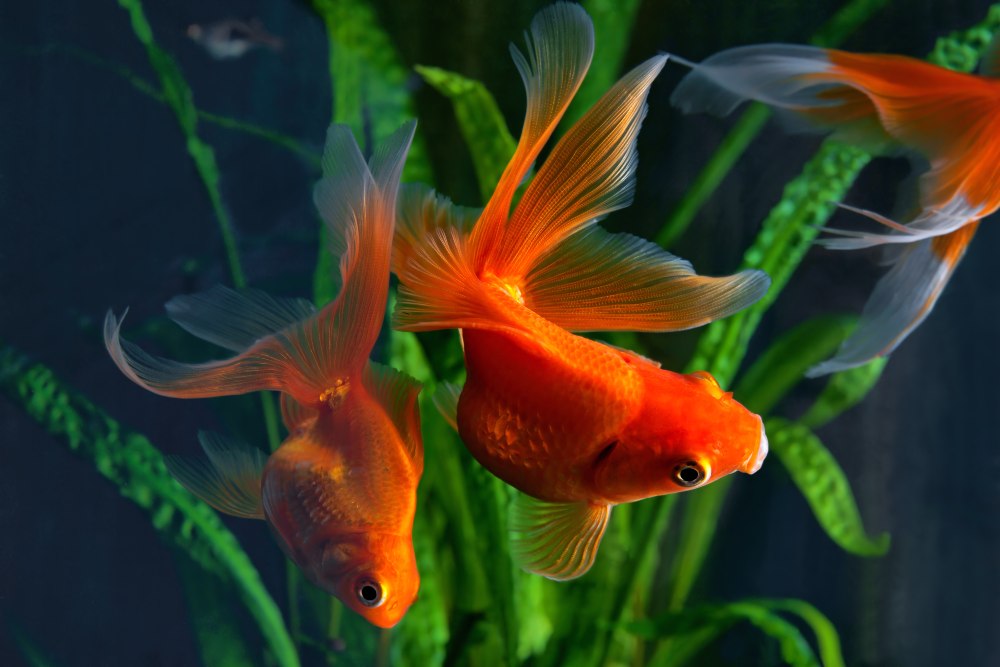Betta fish are very territorial and aggressive. They won’t spare a single second to attack their tank mates the moment they feel threatened. You have to be incredibly cautious about picking other fish species to keep in the same tank.
One question we often get is: can betta fish live with goldfish?
The answer is a bit complicated and keeping them together can be a challenge. Read this complete article to understand whether you should keep betta fish and goldfish in the same fish tank.
Can you keep betta fish and goldfish in the same tank?

One thing to know about betta fish is that they are a highly aggressive fish, which is why they are often called a Siamese fighting fish.
But although betta fish are pretty aggressive, there are certain tank mates you can keep them with (such as different types of shrimp).
But many people want to know if they can keep the tropical betta fish with a goldfish. And the answer? It’s not a good idea mainly because both need very different tank conditions. Here is a detailed breakdown of the crucial differences between the living conditions of goldfish and betta fish.
Different water temperatures

The temperature difference between betta fish and goldfish is one of the primary conditions to think of before making them tank mates. Bettas are tropical fish, so they require warmer water temperatures. The ideal tank temperature for betta fish is between 75 to 80 degrees Fahrenheit.
Goldfish, on the other hand, are cold-water fish, so they aren’t used to living in warm water. Goldfish need a temperature between 68 to 74 degrees Fahrenheit.
While those ranges might seem similar to you, they are drastically different for fish. Betta fish’s ideal temperature is above the maximum temperature goldfish can tolerate. Some hobbyists try keeping the two species at around 74 degrees, but that’s not the best idea.
Low aquarium temperature for your betta fish can cause temperature shock, and it will show other detrimental effects like appetite loss, slow metabolism, and cause your betta fish to stress out.
A slower metabolism can cause swim bladder disease and constipation. Additionally, the fighting fish becomes more vulnerable to fin rot with lower temperatures.
Similarly, keeping goldfish in higher water temperatures will show similar negative effects like temperature shock and slower metabolism.
As a result, both goldfish and betta fish’s health will deteriorate, plus their life expectancy will reduce.
Different water hardness
Bettas live in soft waters with zero to very minimal calcium levels. Also, bettas need pH levels of around between 6.8 and 7.5. Unlike bettas, goldfish prefer higher pH levels of approximately 7.2 to 7.6 and higher calcium content.
Such a different tank setup is going to harm both the fish, and they won’t be able to survive for long.
The difference in living conditions
Betta fish are highly sensitive to the living environment and can get stressed out if things aren’t just right.
They need clean tanks and in dirty tanks can experience various illness and diseases. Goldfish are known as being “dirty fish”. As goldfish tend to eat lots, they also excrete more waste than other fish. The extra waste in the tank can lead to ammonia poisoning.
With all the extra waste from a goldfish, you’ll need to clean your tank more frequently. For reference, you should clean your betta’s tank weekly, whereas goldfish require bi-weekly tank cleanings.
All those additional water change will stress out the betta fish and affect its immune system. If you don’t clean the tank water frequently, it will lead to ammonia spikes, which are extremely dangerous for betta health.
You might think you can balance out the situation by installing a strong filter to keep the ammonia levels in check. While goldfish won’t react to such strong filters, the betta will struggle to swim and get stressed even more.
Aggression and fin nipping
We don’t need to mention more about betta fish’s aggression towards other fish. The Siamese fighting fish won’t spare a second to attack anything that it views as a threat; as a result, the goldfish may end up dying.
Additionally, goldfish are fin nippers, which again is very dangerous for the betta fish. Keeping these two together will definitely get bettas fins nipped, and ultimately it’ll face health issues like fin rot or fin loss. The colorful fins are the best attractions of these tropical fishes, so you shouldn’t put them at such risk.
Tank size and tank décor
The next thing you must know is that bettas and goldfish tank sizes vary significantly. You can house a betta fish comfortably in a five-gallon tank, but a pet goldfish needs a bigger tank. A goldfish tank should be around 30 gallons because of the size difference between the two fish.
Bettas are small fish compared to goldfish. Goldfish grow up to 12 inches in their natural habitat, but they grow about six inches in the tank, whereas the betta fish just grow about 2 1/2 inches.
Another drawback of their size difference is that it makes betta fish quite vulnerable. Goldfish eat anything, so if they get too hungry, they will eat the betta fish.
Both the goldfish and betta fish have different preferences when it comes to tank décor. Bettas are true tropical fish, so they love shady waters with lots of plants. Goldfish, on the other hand, prefer lots of open swimming space, so lots of driftwood and real plants would disturb the goldfish.
Creating a tank environment that would make each fish happy is near impossible.
Food habits
The difference in food habits is also very significant between the Betta Splendens and goldfish. Goldfish are omnivorous, while betta fish are carnivorous, so they might end up eating each other’s food if kept in the same tank.
Goldfish are also fast eaters, and they eat everything. They could easily snatch a betta’s food before the betta gets a chance to eat it. If the goldfish eat too much meat, it will disrupt their diet resulting in health issues. Similarly, if the betta fish overeat vegetarian goldfish food, it’ll affect the betta’s digestive system.
Is It Worth Keeping Betta Fish And Gold Fish Together?

As you can see, there are more differences than similarities between the two fish’s living conditions. Goldfish and betta fish are two popular fish species for aquariums, so most aquarists want to house these two together. But is it worth keeping these two together, with so many risks involved?
We would say no. Bettas are very susceptible to water conditions, so they would find it almost impossible to adjust with the goldfish. Goldfish produce lots of tank discharge, meaning you would have to change tank water more often.
Such frequent partial water changes are harmful to the betta. Additionally, since goldfish tend to eat anything, there is a high chance it’ll consume betta’s food. It’ll again lead to two negative situations: the betta will remain underfed, and the goldfish will get overfed, both of which are not good for your fish’s health.
Conclusion
Bettas enjoy living in a quarantine tank, so you better keep it isolated and provide the best tank environment for your pet fish. If you want to keep your goldfish in a community tank, keep it with suitable tank mates, so there are no potential life threats to it too.
FAQs
Although your betta fish might try to attack a goldfish, betta fish will not eat goldfish. Goldfish are much bigger than bettas.
Yes, your betta can eat goldfish food if they are kept in the same tank. Alternatively, goldfish will each betta fish food.
Goldfish and bettas don’t make very good tank companions since they have very different living requirements. Keeping the two species together will threaten each other’s lives.
